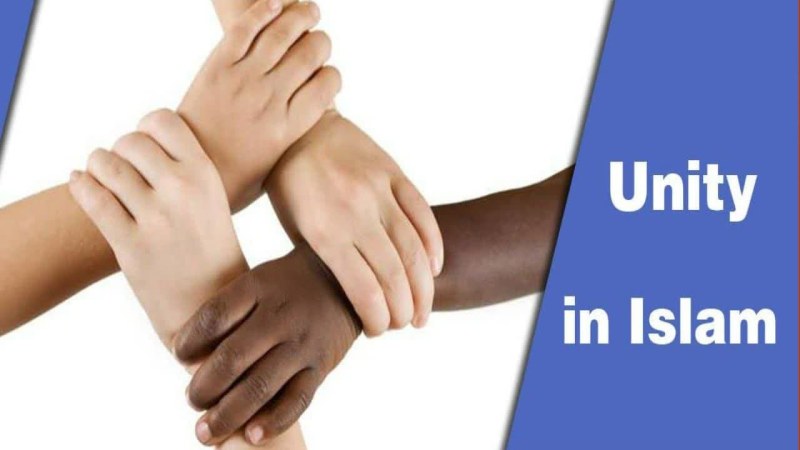Unity is one of the central topics in Islam, which the Holy Quran and Imams of Ahl Al-Bayt (a.s) have emphasized a lot. The Qur'an considers unity as the basis of monotheism, and after ordering Muslims to unite, it warns of the consequences of devision, which is humiliation and defeat. Unity is one of the obligations in the Islamic society. Whenever there is a conflict or war between two groups of the Islamic Ummah, it is obligatory on the rest of the Islamic society to create peace between them.

Unity, the religious obligation and the code of authority and dignity of Islam
Unity means oneness and harmony of society. The Holy Qur'an, the Sunnah of the Prophet and the Imams of the Ahl Al-Bayt (a.s) emphasize unity and warn against divisions. Common sense also praises the phenomenon of unity and condemns its opposite, which is division.
Unity the axis of Tawheed:
The Holy Qur'an considers monotheism as the axis of unity, when God sends his prophet to the people of the books (Jews and Christians), he invites them to join the slogan of monotheism and separation from others and says: "O Prophet! Tell the people of the book, come on the basis of The word that is common between us, that we do not worship other than God and do not take each other as lords before God..."[1] from this verse is used, whoever does not accept monotheism, will not be in the circle of unity with monotheists.
Islamic Unity:
Unity is one of the basic issues in Islam, which God has identified in the Holy Quran as the cause of the dignity and authority of the Islamic Ummah, and on the other hand, he has introduced the disunity and divisions as the cause of the loss of the power and dignity of the Islamic society.[2]
The Holy Qur'an invites Muslims to unity and warns against differences and divisions by using words such as: "Watasemu"[3] "ta'awnaoo"[4] "aslehu"[5] “latafarraqu”[6]. The Holy Qur'an does not renunciate differences between the Islamic Ummah and orders that whenever there is a difference or a war between two groups of believers, it is obligatory for the Islamic community to make peace between them, even if one of those groups does not accept peace. They should do Jihad against that group to stop the rebellion.[7]
Unity based on common points:
The Holy Quran points out the common point when confronting the People of the Book and calls the followers of monotheistic religions to unity based on the same common point which is monotheism.[8] Therefore, if we Muslims have a point in common with the People of the Book, then with the Islamic sects with which we have many points in common, we are definitely tasked to stick to the common points and not fuel differences.
Unity in the Sunnah of the Prophet of Islam:
After migrating to Madinah, the Prophet of Islam established a bond of brotherhood between the tribes of Aus, Khazraj, Muhajir and Ansar so that the Islamic community would have a united spirit and be able to resist the enemies of Islam.[9]
The first lesson that Muslims learned from division and not following a unified command, which caused their defeat, was the Battle of Uhud. In this war, Muslims practically understood that if they want to always be victorious in the field and not experience the humiliation of defeat, they must always maintain their unity.
The history of Islam has shown that whenever Muslims have unity, they have been incensed by the dignity of the dignitary. On the contrary, whenever they have been divided and scattered, they have been defeated and humiliated in front of the front of the infidels.
In the contemporary world, Muslims are facing the world of disbelief and arrogance, who always seek to humiliate and weaken Islam and Muslims. For example, the Qur'an and the Prophet of Islam, which are the two biggest factor in the unity of Muslims, today they show their desperation to attack the unity of the Islamic society by insulting the Qur'an and the beloved Prophet of Islam.[10]
Conclusion:
If we Muslims, both Shia and Sunni, want to keep Islam and the Islamic society high and dignified forever, we have no choice but to put aside our differences and unite to preserve Islam and its highest interests.
[1] https://quran.com/3?startingVerse=64
قُلْ يَـٰٓأَهْلَ ٱلْكِتَـٰبِ تَعَالَوْا۟ إِلَىٰ كَلِمَةٍۢ سَوَآءٍۭ بَيْنَنَا وَبَيْنَكُمْ أَلَّا نَعْبُدَ إِلَّا ٱللَّهَ وَلَا نُشْرِكَ بِهِۦ شَيْـًۭٔا وَلَا يَتَّخِذَ بَعْضُنَا بَعْضًا أَرْبَابًۭا مِّن دُونِ ٱللَّهِ
[2] https://quran.com/8?startingVerse=46 وَلَا تَنَـٰزَعُوا۟ فَتَفْشَلُوا۟ وَتَذْهَبَ رِيحُكُمْ ۖ
[3] https://quran.com/3?startingVerse=103 وَٱعْتَصِمُوا۟
[4] https://quran.com/5?startingVerse=2 وَتَعَاوَنُوا۟
[5] https://quran.com/49?startingVerse=10 فَأَصْلِحُوا
[6] https://quran.com/3?startingVerse=103 وَلَا تَفَرَّقُوا۟ ۚ
[7] https://quran.com/49?startingVerse=9
وَإِن طَآئِفَتَانِ مِنَ ٱلْمُؤْمِنِينَ ٱقْتَتَلُوا۟ فَأَصْلِحُوا۟ بَيْنَهُمَا ۖ فَإِنۢ بَغَتْ إِحْدَىٰهُمَا عَلَى ٱلْأُخْرَىٰ فَقَـٰتِلُوا۟ ٱلَّتِى تَبْغِى حَتَّىٰ تَفِىٓءَ إِلَىٰٓ أَمْرِ ٱللَّهِ ۚ فَإِن فَآءَتْ فَأَصْلِحُوا۟ بَيْنَهُمَا بِٱلْعَدْلِ وَأَقْسِطُوٓا۟ ۖ إِنَّ ٱللَّهَ يُحِبُّ ٱلْمُقْسِطِينَ
[8] https://quran.com/3?startingVerse=64
[9] https://fa.wikifeqh.ir/%D8%A2%DB%8C%D9%87_%D9%88%D8%AD%D8%AF%D8%AA
[10] https://makarem.ir/main.aspx?lid=0&mid=249718&typeinfo=23&catid=24212
Unity is one of the central topics in Islam, which the Holy Quran and Imams of Ahl Al-Bayt (a.s) have emphasized a lot. The Qur'an considers unity as the basis of monotheism, and after ordering Muslims to unite, it warns of the consequences of devision, which is humiliation and defeat. Unity is one of the obligations in the Islamic society. Whenever there is a conflict or war between two groups of the Islamic Ummah, it is obligatory on the rest of the Islamic society to create peace between them.If we Muslims, both Shia and Sunni, want to keep Islam and the Islamic society high and dignified forever, we have no choice but to put aside our differences and unite to preserve Islam and its highest interests.



